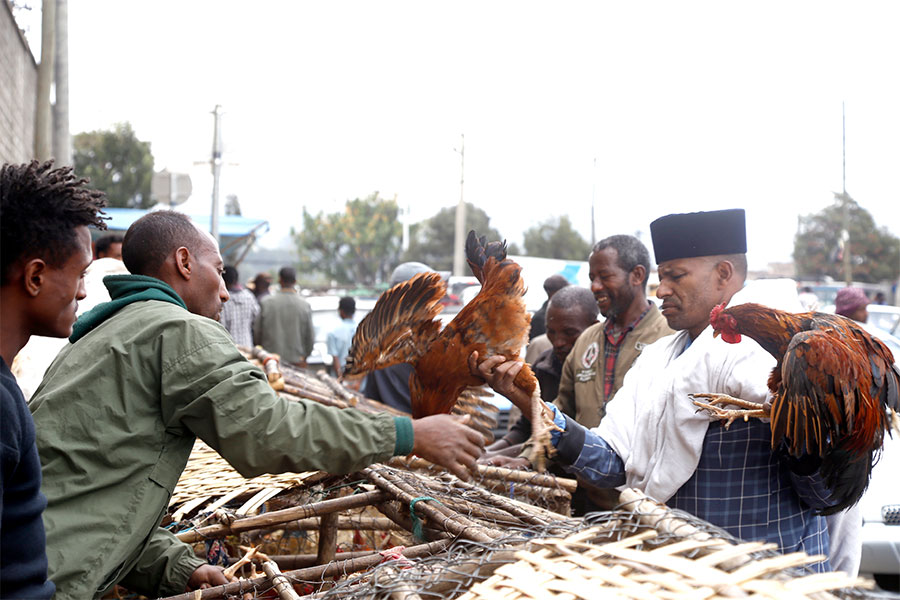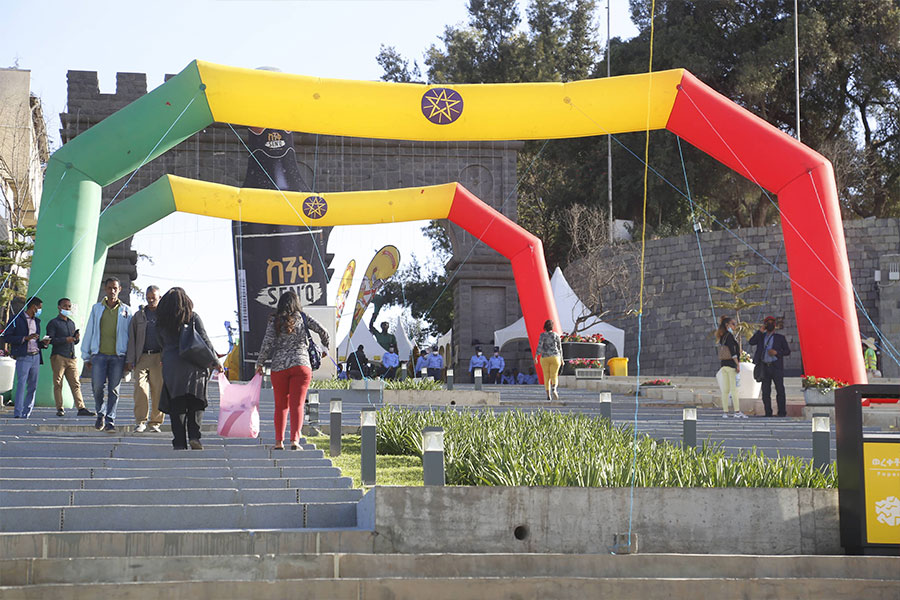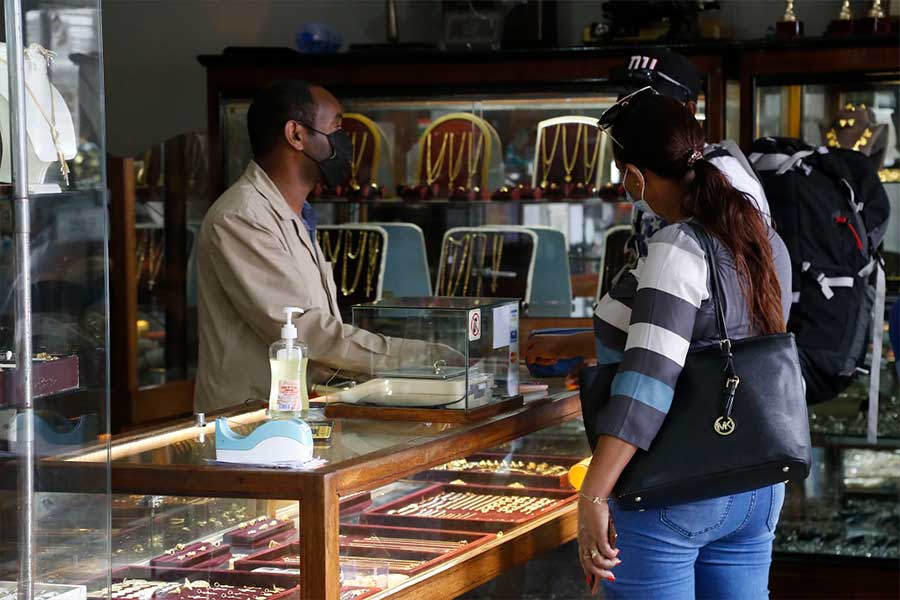
One of the largest open markets, Shola Gebeya near the Megenagna area, was not radiating its usual ora. Shola is one of the largest trade hubs in Addis Abeba, hosting thousands of traders selling food and non-food items. The traders are in sorrow as a fire started at a boutique last Monday night had expanded to different corners, leaving some partially burned while destroying corners that sold butter.
Most are shattered by the event, while some try to toughen up, huddling around the butter corner. The fire burned close to 80 shops, and the accident caused a loss of an estimated 50 million Br worth of property.
Wubesht Bogale and Shemelis Sisay are traders appointed by the people, making a speech in front of the lined traders. The representatives are persuading their colleagues and people who happened to be in the area to contribute what they can in a sympathetic tone.
Hopeful faces were everywhere as Wubshet asked to form a committee to collect money.
"There are nearly 2,000 shops in the area. We expect at least 5,000 Br from each," Wubshet told Fortune.
Birhanu Yadetta, 63, a father of nine, was one of the traders whose shops were right by the place that started the fire. Amazingly, his properties were left without a scratch.
“It is a miracle," he said. He believes that divine intervention has saved his shop worth more than two million Birr. Birhanu has been a butter trader for the past four decades, and he sources dairy products from Sheno and Gojam.
Another victim who has lost all her property is Selam Birhanu, a mother of one who supports her brother beside herself by selling butter. She said that close to half a million Birr in cash was burned along with packs of butter with a value of 500,000 Br.
"I had brought four packs of butter on credit from farmers and was about to pay," she said.
She expressed her shock sympathetically, which turned the holiday mood upside down. Before the accident, she had planned to celebrate her two-year-old daughter's birthday. At Shola, a kilo of butter, a vital ingredient for a holiday, was sold for 850 Br, which shows a 100 Br difference from the last.
A kilo of honey was sold for 450 Br, showing a 300 Br difference from last year and cheese was sold for 250 Br.
Meseret Belete, a mother of two, made her way to Shola from the Kotebe area. She has been making the trip for years, looking to buy goods and ingredients for the holiday. When she was heading to the butter corner of her regular supplier, only to find out that their shops had been destroyed. Meseret went to another trader and bought three kilos of butter, but seeing her supplier in agony weighed heavy on her.
"The price is fair; it is not as expensive as I expected it to be," she said. For the new year, four months ago, a kilo of butter was sold for an average of 650 Br and 750 Br, 100Br lower than the past week's price. The prices for spices and herbs have also gone up. A spice called Mekelesha mix, often used for stews, stands at 1,500 Br a kilo, 400Br higher than what markets offered the past September.
Westward from the butter quarter in Shola Market lie the stalls selling chickens. This section of the marketplace is also teeming with buyers. Some of the stocks of the traders were empty, and some had filled their stocks with a few domestic breeds, the preferred choice for buyers, sold for between 750 Br and 1,100 Br. The going rates were not so different from the past. Chickens are brought to markets in the capital from Wello in Amhara Regional State.
Those in stock have been shipped from Dessie, in the Amhara Regional State, according to Birhanu Demeke, one of the chicken traders in Shola. He has only sourced 40 Chickens from Farmers.
“There is a supply shortage from poultry farms," said Birhanu.
Eden Taddesse, 33, who was visiting the market with her friend, was not surprised to see a little increase in the price of chickens. She bought two large-sized chickens paying 900 Br for each.
"The market is not as inflated as I expected," she told Fortune.
Eggs, which cost 13 Br apiece a couple of months ago, are now priced at 11 Br from distributors and 13 Br from retail shops. A kilo of onion is sold for up to 28 Br at Shola Gebeya. It is less than what traders have been asking during the new year holiday celebrated four months ago, which was 60 Br.
Shoppers were out to the market looking to buy cattle all around the city. Qera, the area where sheep and cattle trading used to be hyped now seeing fewer buyers. Mulugeta Girma, 30, is looking to buy a medium-sized cattle with his friend Solomon Getachew. They had plans to find what they are looking for within 40,000 Br.
"We want to buy everything early before the holiday nears," Mulugeta said.
They have tried to visit other cattle trading centres, such as Bulbula, on the outskirts of Addis Abeba. They found the cattle price at Qera much better than the ones they have been at. The primary sources of cattle sold in the capital are Jimma, Welega, and Arba Minch towns.
People gather to clean up the rubble after fire dies down in Shola Gebeya area
Keyetmetah Haile has been trading cattle at Qera for five years. He brought ten cattle from Jimma five days ago, each going for between 35,000 Br to 200,000 Br and has already sold six.
"I hope I'll sell the rest at a much better price," he said.
Prices for a sheep went from 7,000 Br to 15,000 Br depending on size, while a goat ranges between 12,000 Br to 25,000 Br.
Abdela Sherif, a livestock trader, was among those standing in the market in the Qera area. He brought 40 sheep from Agaro town. He is scared that he would have to take his sheep back as he was not seeing a holiday vibe in the city.
"I haven't even sold one," Abdela told Fortune.
The Addis Abeba Abbatiors Enterprize estimated 2,500 to 3,000 cattle and 800 to 1,000 livestock slaughters for the Christmas celebration.
In supermarkets, people also look for packed chicken and lamb meat. Fresh Corner is highly known for its packed dairy products. It has been supplying its products for decades through eleven branches in the city.
A kilo of packed chicken meat is sold for 375 Br for Habesha chicken while a kilo of lamb is sold for 475 Br.
Around 150 people visit their market to buy chicken and sheep meet regularly.
"We expect 1,500 customers to visit us for the Holiday," said Mustefa Ibrahim, the manager of Fresh Corner Bole branch.
Fresh Corner has provided different packages for the holiday. Whole parts of packed sheep are sold for 2,700 Br, with a bonus of free offal. A Kitfo, with Mitmita, a.k.a grilled chilli, Cardamom, and local butter, is sold for 1,650 Br with the bonus of traditional soft cheese.
Shewa supermarket, on the other hand, has been in business for about 56 years operating through its seven branches in the capital. It provides packed chicken and dairy products for its customers at a higher price than Fresh corner. Local chicken meat is sold for 400 Br, and hybrid chicken is sold for close to 260 Br a kilo. They also sell a "Kullet" (onion paper powder and spices decoction), which costs 260 Br.
Mulat Mamo, a salesperson at Shewa saw the holiday as less vibrant. They used to finish their stokes the week before the holiday, but this time even though days are getting closer to the Holiday.
"We are not selling as we have expected," he said.
Young ladies, foreigners, diasporas, and people who want to send the Ethiopian brand chicken stew abroad visit their mart usually.
Solomon, a supervisor at Queen Mart, said that people prefer to buy the packed chicken meat than the other chickens. There is a chicken supply shortage and we are almost running out, he said.
Purpose Black is a new brand initiative launched in May 2020 by more than 130 black experts. Purpose Black, as the name suggests, aims to economically address some of the most pressing issues confronting black people worldwide. The first model of this global initiative is being prepared for launch in Ethiopia. The PurposeBlack Ethiopia initiative can be a multi-billion Birr task to construct and release a mega agro-processing complex, an e-commerce marketplace, five hypermarkets, ten huge supermarkets, and a network of over a thousand retail and distribution stores throughout Ethiopia.
"It has been a year since the company entered the chicken market. "Following market demand, we have shifted to providing vegetables and fruits," said Amanuel from Purpose Black. They sell a kilo of onion for 20 Br.
Government officials have enacted a series of measures in a futile attempt to control the unabated inflation and stabilize markets. About 137 consumer associations held exhibitions and bazaars to prevent supply shortages for the Christmas celebration in Addis Abeba.
Officials of the Addis Abeba City Trade Bureau have organized a task force to control the holiday market, according to Meketa Adafere, Advisor of the Trade Bureau.
On the contrary, Atlaw Alemu (PhD), an economist with over four decades of teaching at the Addis Abeba College of Business & Economics, says that if the inflationary rate continues the market will dry up more. According to Atilaw, the cost of living is through the roof, while income for most remains unchanged.
"It will be difficult to celebrate the holiday as before," Atlaw told Fortune.
PUBLISHED ON
Jan 07,2023 [ VOL
23 , NO
1184]

Commentaries | Sep 01,2024

Commentaries | Jul 31,2021

Radar | Nov 20,2023

Fortune News | Jul 08,2023

Commentaries | Nov 06,2021

Commentaries | Apr 29,2023

Fortune News | Apr 22,2022

Agenda | Jan 01,2022

Commentaries | Oct 20,2024

Agenda | Oct 10,2020

Dec 22 , 2024 . By TIZITA SHEWAFERAW
Charged with transforming colossal state-owned enterprises into modern and competitiv...

Aug 18 , 2024 . By AKSAH ITALO
Although predictable Yonas Zerihun's job in the ride-hailing service is not immune to...

Jul 28 , 2024 . By TIZITA SHEWAFERAW
Unhabitual, perhaps too many, Samuel Gebreyohannes, 38, used to occasionally enjoy a couple of beers at breakfast. However, he recently swit...

Jul 13 , 2024 . By AKSAH ITALO
Investors who rely on tractors, trucks, and field vehicles for commuting, transporting commodities, and f...

Jun 28 , 2025
Meseret Damtie, the assertive auditor general, has never been shy about naming names...

Jun 21 , 2025
A well-worn adage says, “Budget is not destiny, but it is direction.” Examining t...

Jun 14 , 2025
Yet again, the Horn of Africa is bracing for trouble. A region already frayed by wars...

Jun 7 , 2025
Few promises shine brighter in Addis Abeba than the pledge of a roof for every family...